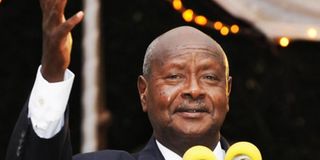Museveni unveils new ‘old’ 20-point agenda

President Museveni addresses Muslims at State House Iftar dinner on Wednesday. PHOTO BY FAISWAL KASIRYE
What you need to know:
Promises. Some of the prorities are part of the President’s 1986 10 Point Programme.
Kampala. Without explaining what became of his Bush War 10-point programme, President Museveni at a cabinet meeting on Thursday, unveiled a new 20-point development agenda, restating his promise of turning Uganda into a middle income country in the next four years.
Mr Museveni, according to cabinet sources, listed 18 priority action points, that he wants his new government to focus on in the next five years.
However, before cabinet adopted his “new” plan, ministers added two points on his list of priorities; supporting the water sector to widen safe water coverage and intensifying resource mobilisation to fulfil the agreed upon priorities.
At the inaugural cabinet meeting last week, the President had listed 15-priority points, starting with the need to aggressively look for investments and listed corruption as the second priority issue that must be addressed in order to drive Uganda to a middle income status. However, in the second Cabinet meeting at State House Entebbe on Thursday, he added three more points and the ministers added two before he officially unveiled his “new” 20-point plan for Uganda. For the first time, Mr Museveni promised to hold periodical meetings with the ministers and technocrats in the various dockets to assess progress, looking at specific deliverables and indicators he listed. The three points added by the president are improving government communication, supporting the judiciary with all the human and financial resources to improve delivery of justice and fighting crime and urban physical planning.
After what sources called “a comprehensive discussion” of Mr Museveni’s 18-point programme, the ministers also added two on the list.
A statement from Information and ICT minister Frank Tumwebaze, said the President “stressed that organised urban planning is not only good for the environment, tourism but a great enabler for job creation through organised urban trade.”
The statement also confirmed the President’s 20-point agenda, repeating some of the things the President had promised to do 30 years ago when he captured power in 1986.
For instance, in his revised 10-point programme of 2012, among the 10 key bottlenecks he had promised zero tolerance to corruption, improving education to refine human resource, modernising agriculture and job creation, among others. Some of these priorities were also part of the president’s old 10-point programme of 1986.
Mr Tumwebaze said in the medium term under the ICT sector, “the President wants the Ministry of ICT to start and build a strong department of electronics that will ensure assembling of computers, among other electronics.”
“The President wants to see responsible and disciplined media reporting that is not injurious to the image of Uganda and tasked government agencies to always communicate timely and factually about government work and thus the reason he merged the communication agencies into one ministry for easy coordination,” Mr Tumwebaze said in the statement.
The President, according to Mr Tumwebaze, however, noted that all the 20 listed priorities notwithstanding, the issues which must always have the first call on the budget resources remain defence and security, electricity generation and distribution, tarmacking of the already identified roads in the NRM manifesto 2016-2021; concluding all the remaining funding modalities for the Standard Gauge Railway project to start; acquisition of Japanese road equipment for districts for routine maintenance of feeder roads.
Other core priorities are support to operation wealth creation (Naads) to scale up the supply of inputs to farmers with special attention to the 68 per cent homesteads that still operate outside the money economy because of being subsistence producers, supporting and financing of industrial parks in the already identified 22 zones, continued investment in education and health programmes and financing of the science innovation, youth and women funds.
The president’s 10-20 point programme over the years
20-point programme of 2016
1. Lower the cost of electricity
2. Lower cost of transport
3. Build 22 Industrial Parks to attract investors
4. Uganda Investment Authority must get all the necessary licences in two days
5. There must be zero tolerance to corruption.
6. Poor regulation must be handled
7. Converting 68 per cent of the homesteads from subsistence to commercial agriculture.
8. Expedite the granting of oil production licences to enable actual production start 2019/2020.
9. Reform minerals sector.
10. Protect environment.
11. Address service delivery decisively, focusing on healthcare, Education and feeder roads
12. Stop illegal land evictions
13. Providing accommodation/social services for security officers
14.Setting up a national airline
15.Elimination of our indebtedness to the army veterans
16. Improve government communication;
17. Support the judiciary with all the human financial resources to improve the justice system
18. Fight against crime and then, the issue of urban physical planning.
19.Support the water sector to widen safe water coverage
20. Intensify resource mobilisation for fulfilment of the agreed upon priorities
10-point programme of 1986
• Democracy
• Security
• Consolidation of national security and elimination of all forms of sectarianism
• Defending and consolidating national Independence
• Building an independent, integrated and self-sustaining national economy
• Restoration and improvement of social services and the rehabilitation of the war-ravaged areas
• Elimination of corruption and misuse of power
• Redressing errors that have resulted in the dislocation of sections of the population and improvement of others
• Co-operation with other African countries in defending human and democratic rights of our brothers in other parts of Africa
• Following an economic strategy of mixed economy,
Revised 10-point programme, 2012
• Fighting ideological disorientation
• Eliminating sectarianism
• Improving education to refine human resource
• Facilitating private sector-led economic growth
• Developing road, rail and electricity infrastructure
• Market expansion through regional integration
• Pursue industrialisation for exports value addition
• Develop the service sector to create jobs
• Modernise agriculture to increase household incomes
• Deepen democratic governance.




